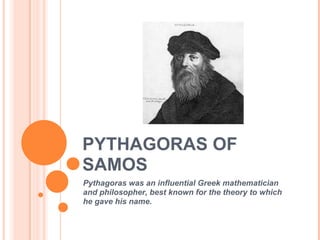
Pythagoras Of Samos - Maths Project.
- 1. PYTHAGORAS OF SAMOS Pythagoras was an influential Greek mathematician and philosopher, best known for the theory to which he gave his name.
- 2. ●Pythagoras of Samos is often described as the first pure mathematician. He is an extremely important figure in the development of mathematics yet we know relatively little about his mathematical achievements. Unlike many later Greek mathematicians, where at least we have some of the books which they wrote, we have nothing of Pythagoras's writings. The society which he led, half religious and half scientific, followed a code of secrecy which certainly means that today Pythagoras is a mysterious figure
- 3. EARLY LIFE ●Born on the island of Samos, off Greece, in the Mediterranean Sea, Pythagoras was the son of Mnesarchus. Little is known about his early life. After studying in Greece, he fled to southern Italy to escape the harsh rule of Polycrates (died c. 522 B.C.E. ), who came to power about 538 B.C.E. There he began teaching and soon had a clutch of students who lived a structured life of study and exercise, inspired by a philosophy based around mathematics. This circle came to be known as the Pythagoreans.
- 4. EARLY LIFE ●Pythagoras and his followers became politically powerful in Croton in southern Italy, where Pythagoras had established a school for his newly formed sect, or group of followers. It is probable that the Pythagoreans took positions in the local government in order to lead men to the pure life that was directed by their teachings. Eventually, however, a rival group launched an attack on the Pythagoreans at a gathering of the sect, and the group was almost completely destroyed. Pythagoras either had been forced to leave Croton or had left voluntarily shortly before this attack. He died in Metapontum early in the fifth century B.C.E.
- 5. PYTHAGOREANS ●The early Pythagoreans were upper middle class and politically active. They formed a moral elite who strove to perfect their physical form in this life in order to gain immortality in the next. To free the soul and achieve immortality, the mortal body had to be rigorously disciplined to keep it morally pure and free of the base nature. Until this could be achieved the soul would be repeatedly reincarnated, or 'transmigrated', until released by accumulated merit.
- 6. BELIEFS ●Pythagoreans also believed in the cosmos, which at that time referred to an idea of a clockwork order and beauty in the whole universe. While probably believing in classical Greek polytheism, they maintained a superior divinity, the one, above all others. They had a number of taboos, including the avoidance of meat and beans, and lived by a series of rules governing all aspects of life. In approximately 500 BC, there appears to have been an uprising against the power of the Pythagoreans. Pythagoras fled and is thought to have been killed or died shortly afterwards.
- 7. MATHEMATICAL TEACHINGS ●So great was the Pythagoreans' respect for the "Tetractys of the Decad" (the sum of 1 + 2 + 3 + 4) that they swore their oaths (promises) by it rather than by the gods, as was normal during his day. Pythagoras may have discovered the theorem which still bears his name (in right triangles [triangle with one angle equal to 90 degrees], the square on the hypotenuse equals the sum of the squares on the other sides), although this proposal has been discovered on a writing stone dating from the time of the Babylonian king Hammurabi (died c. 1750 B.C.E. ). Regardless of their sources, the Pythagoreans did important work in extending the body of mathematical knowledge.
- 8. MATHEMATICAL TEACHINGS ●As a more general outline, the Pythagoreans presented the two contraries (opposites), Limited and Unlimited, as ultimate principles, or truths. Numerical oddness and evenness are equated with Limited and Unlimited, as are one and plurality (many), right and left, male and female, motionlessness and movement, straight and crooked, light and darkness, and good and bad. It is not clear whether an ultimate One, or Monad, was presented as the cause of the two categories.
- 9. PYTHAGORAS THEOREM ● His main discovery was the Pythagoras theorem: ●The theorem has numerous proofs, possibly the most of any mathematical theorem. ●These are very diverse, including both geometric proofs and algebraic proofs, with some dating back thousands of years. ●The theorem can be generalized in various ways, including higher- dimensional spaces, to spaces that are not Euclidean, to objects that are not right triangles, and indeed, to objects that are not triangles at all, but n-dimensional solids. ●In any right-angled triangle, the square of the hypotenuse is equal to the sum of the squares of the other two sides
- 10. DEATH ●Pythagoras's death is unknown. Some say he died in a revolt in which the meeting place of the Pythagoreans was surrounded and set to fire, of which only a few survived. Others say the members formed a bridge using their bodies over the flames to allow Pythagoras to escape. He fled to Metapontum where he chose to die at the hands of his enemies rather than trample over a sacred bean field.